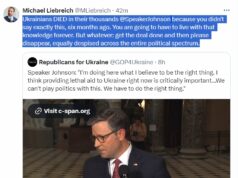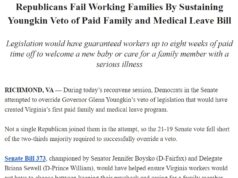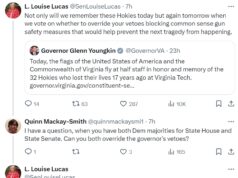( – promoted by lowkell)

Before we discuss the best strategy moving forward, it is necessary to develop consensus around what a state party should do. While we might have differing opinions on that issue, for the purposes of this plan I am operating on the assumption that the state party’s primary objective should be to win offices for state office (Governor, Lt. Governor, Attorney General, State Senate, State House).
Obviously this does not include everything that DPVA can do, but it includes some basic ideas about what DPVA should do.
Every winning campaign typically requires:
1. a cohesive message strategy;
2. a strong grassroots network;
3. a candidate to elect; and
4. the money to get your word out and provide the support your grassroots network needs.
1. A cohesive message strategy
Currently the Democratic Party in Virginia does not have a cohesive message. What should DPVA do about this?
a) Coordinate a legislative agenda
Barring a miracle, Republicans will now have complete control of Virginia government. It is unlikely that Democrats will be able to pass any substantive legislation in the upcoming session. As a result, it is more important than ever that Democrats coordinate a legislative agenda and develop a positive case for how government would be different under a Democratic majority.
When Republicans are pushing legislation such as TRAP (“Targeted Regulation of Abortion Providers”), Democrats should push a jobs bill. This is the best way to show, rather than tell, how Democrats are focused on the issues important to everyday people.
b) Develop a unified messaging campaign supporting the legislative agenda
It doesn’t matter what the legislative agenda is if nobody hears about it.
In coordination with the legislative agenda, DPVA should push this contrast in “earned media” (blogs, newspapers, and tv news), low-cost paid media (such as Google AdWords), and through email to current supporters.
If targeted correctly, the earned media and paid media will help to foster goodwill among the general electorate in a low-cost manner. This will allow any Democratic candidate to tap into the goodwill generated by that legislative agenda.
The regular email updates to current supporters, focused on driving the contrast between what Democrats would do in power and what Republicans are doing, will help to motivate the grassroots (which sometimes can be prone to feeling like our guys are no better than their guys) to remain involved.
2. A strong grassroots network
This ties in nicely to the idea of keeping the grassroots motivated, but must go much further.
DPVA is too far removed from what is happening on the ground in local communities. Unlike most states, Virginia has elections every year. The start-up costs of building a campaign from scratch every year are wasteful. With a core group of grassroots organizers, you could bypass many of these costs by cultivating local party leadership, developing a network of skilled and committed volunteers, and reduce the amount of time it takes for party leadership to learn about situations developing on the ground.
These grassroots organizers could also assist with identifying potential candidates for office. Some of the most effective candidates for Delegate or State Senate won’t be the people you meet on a quick tour through town, but are connected to their community through their school’s PTA, their local Chamber of Commerce, or simply by owning a local store that everyone visits. These are the types of people you meet when you have an organizer committed to getting to know the community.
3. A candidate to elect
This one seems the most obvious, but it is also the most important. DPVA must recruit candidates to run in every district. I am not going to argue that Democrats would have won races in any of the districts that they didn’t contest this year, but contesting every district helps every candidate. Why?
a) It limits Republican investment in swing districts
Any candidate who has a contested race that would have otherwise been uncontested will invest a little more money to protect their seat. That is money that would otherwise be spent on other races. If every candidate you contest spends an additional $5,000 on his own re-election effort, that adds up to real money over the course of 46 newly contested campaigns (the number of Delegate seats left uncontested by Democrats this year).
b) It gives DPVA the opportunity to maximize unexpected opportunities
I’m not going to enumerate the possibilities here, but there are plenty of ways a politician can get himself into trouble. If that candidate doesn’t have opposition, it is pretty hard to utilize it to one’s advantage.
c) It reinforces the efforts that the grassroots organizers do.
Many people enter politics through a campaign (e.g. OFA 2008), rather than through the local Democratic party. This will allow us to bring new people into the process and strengthen the grassroots presence.
d) Democratic candidates running creates momentum for future Democratic candidates
The message of the candidate who ran two years prior can reinforce the message of this year’s candidate. Further, in some places Democratic candidates are seen in the same light as many independent candidates – as unelectable. As voters get used to seeing a Democrat on the ballot for local office, it will make the choice seem like less of a false choice.
4. The money to support all this
As unlikely as it seems, DPVA is currently in a fantastic position to fundraise on a national level, but we need to do it aggressively.
a) Develop a national fundraising message
Over the next two years, elections in Virginia will have implications for Democrats across the country. In 2012, Virginia remains up for grabs in the presidential elections and could influence the balance of power in the U.S. Senate. In 2013, Virginia will elect a new Governor – an off-year election that the talking heads always suggest demonstrates how voters are feeling nationally. As a result of this, a well-funded DPVA is in the best interests of Democrats everywhere.
b) Use our talent pro-actively
DPVA has a deep bench of potential fundraisers. Mark Warner, Jim Webb, Tim Kaine, Terry McAuliffe, and Tom Perriello spring immediately to mind. Mark Warner is well-loved in the business community and has never had a problem raising money for his campaigns. Tim Kaine and Terry McAuliffe are former DNC Chairmen and either current or likely candidates for statewide office. DPVA should utilize them to help tap into national donor networks. Tom Perriello is a favorite of many progressives. Virginia has top-flight fundraising talent, it just needs to do a better job of utilizing it creatively
c) Invest wisely
This goes directly to what you think the purpose of DPVA should be. I would argue that DPVA should limit spending in federal elections and focus their resources on state elections. President Obama will have a huge warchest, as well as the DNC helping to augment his spending. Governor Kaine will have a huge warchest and the DSCC to augment his spending. Congressional candidates will have assistance from the DCCC.
DPVA should focus its money on regular institutional spending (staff, organizers, and the low-cost paid media suggested above) and state-level elections. This will help us to compete across the state in off-year elections.


 Sign up for the Blue Virginia weekly newsletter
Sign up for the Blue Virginia weekly newsletter






![Sen. Mark Warner: “The best time to [pass aid to Ukraine] would have been months ago. The second best time is right now.”](https://bluevirginia.us/wp-content/uploads/2023/02/warner0207-100x75.jpg)
![Audio: Del. Marcus Simon Says “If it takes electing a Gorka [as Fairfax GOP Chair] to…wake people up to [the fact that THIS is who Fairfax Republicans are], then I’m a BUY on that!”](https://bluevirginia.us/wp-content/uploads/2024/04/gorkamontage-100x75.jpg)
